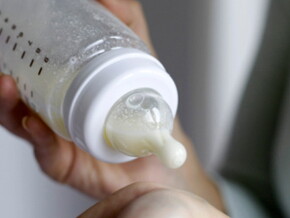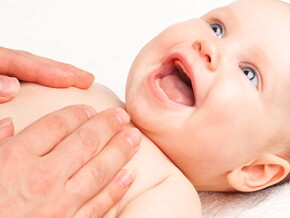
When baby is born, they have yet to be exposed to any good or bad bacteria from the outside world. But, over the days and weeks after birth, they are exposed to new bacteria, viruses and other microorganisms like yeast. All of this helps to build baby’s healthy gut flora, which is essential to an infant's gut health and immune system and has been shown to have an effect on their overall health in later life. Keep reading to discover more about your baby’s gut health and how probiotics can benefit your little one.
What are probiotics?
Probiotics are good bacteria that are beneficial to our bodies, specifically our digestive and immune systems. Probiotics constantly interact with the gut flora that live in our digestive tract and contribute to the health of our immune system. Researched and recognized by the scientific community, the gut flora are a delicately balanced community of more than 500 different types of bacteria.
There are different strains of probiotics and they are each unique in their characteristics and the benefits they have on health. Bifidobacteria and lactobacilli are common types of probiotics found in food. These specific types of good bacteria can help balance the gut flora.
Why are probiotics important for my baby?
In the early stages of life, several factors such as changes in diet, physical and emotional stress, weaker natural immunity, infections, or antibiotic treatments can upset the balance of your baby’s gut flora. This can possibly lead to digestive discomfort or colic. Probiotics are good bacteria that help restore your child’s gut flora. These bacteria are also an important part of the way that infants and children digest food and extract all the necessary nutrients from what they consume.
Your baby’s gut health is one of the most important hubs of activity in their system that actively impacts their nutrition, immune function and even cognitive development. Probiotics are safe and beneficial for healthy babies and can be especially helpful for babies who are born by C-section, who are not exclusively breastfed, who are given antibiotics, or who tend to have tummy troubles. Probiotics can help develop and promote healthy immune responses.
Immune benefits of probiotics
Probiotics can provide certain health benefits, such as contributing to the development of healthy gut flora and a strong immune system. Bifidobacteria are one type of good bacteria and account for up to 90% of the total naturally occurring bacteria found in the gut of healthy, breastfed babies. Bifidobacteria supplements may even bring the flora of formula-fed infants to be similar to breastfed infants.
Learn more about what to look for in infant probiotic products.
Benefits of probiotics for babies with common conditions
Constipation
Probiotics like L. reuteri can offer relief for babies struggling with constipation by promoting abdominal comfort and softer stools.
Diarrhea
Certain probiotic strains, like L. rhamnosus GG, may help manage different types of diarrhea in babies. These probiotics can balance baby’s gut flora, which may be disrupted by infections or antibiotic use. Although probiotics may reduce the duration and severity of diarrhea episodes, speak to your doctor if the issue is persistent.
Although scientific studies looking at probiotics have shown promising results in the prevention and treatment of common conditions such as constipation and diarrhea in infants and children, there is still more work to be done to conclude other medical benefits there may be for healthy infants.
There are a number of probiotic types that are considered safe for healthy babies and children. It’s worth discussing which probiotic would be safe and effective for your baby with your doctor.
Benefits of probiotics for babies with colic
Probiotic L. reuteri has been shown to reduce crying time in babies with colic. According to some studies, the gut flora of infants suffering from colic contain less good bacteria than the gut flora of other infants. The gut flora may even contribute to the development of colic, because lower levels of good bacteria (lactobacilli) have been observed in colicky infants. Looking for more information on colic? See managing colicky babies.
What are sources of probiotics?
Breast milk
Breast milk is contains probiotic, including bifidobacteria. This means that babies that are getting probiotics through breastfeeding have more bifidobacteria in their gut flora than babies fed with regular formula. Breast milk also contains contains unique fibres called Human Milk Oligosaccharides (HMOs) that promote the growth of good bacteria in baby’s gut. The ever-changing composition of baby’s gut flora will continue to mature as their diet expands to include new and different foods.
Experts agree that breast milk is the best nutrition for baby, and breastfeeding is the best way to provide probiotics. Probiotics are live, safe microorganisms, or ‘good bacteria’ that are naturally found in breast milk and can also be found in certain baby formulas, other foods, and natural health products.
Probiotic supplements
Probiotic supplements for infants and children are also available as a secondary option to probiotics found in breastfeeding. They can be used to support and improve a baby’s gut flora, which is beneficial for boosting immunity and fighting bad bacteria and toxins. For more information, see what to look for in infant probiotic products.
If you would like to give your baby a probiotic supplement, contact your family physician, pediatrician, or pharmacist for the right advice.
This article includes contributions from Dr. Dina Kulik, pediatrician, and Charlotte Geroudet, GD.
 Charlotte Geroudet, RD
Charlotte Geroudet, RD
Charlotte Geroudet is a member of the Ordre professionnel des diététistes du Québec. She has a degree in nutrition from Université Laval and a certificate in dietary techniques from Cégep de Limoilou. In 2010, she founded Nutrition Québec, a company that specializes in healthy weight management, child nutrition and the prevention of chronic illnesses. Charlotte is regularly asked by the media to discuss various nutrition topics; she is also a blogger, columnist, lecturer and co-author of two successful books. Her philosophy is to make principles of healthy eating accessible and appealing.
 Dr. Dina Kulik MD, FRCPC, PEM
Dr. Dina Kulik MD, FRCPC, PEM
Dr. Dina Kulik is a pediatrician and emergency doctor based in Toronto. She is the founder of Kidcrew Pediatrics, and works at the Hospital for Sick Children (SickKids). Dr. Kulik is also Assistant Professor at the University of Toronto. An expert on children’s health, Dr. Kulik often speaks out on topics such as breastfeeding challenges and solid food introduction.
References:
- FAO/WHO. Report on Joint FAO/WHO Expert Consultation on Evaluation of Health and Nutritional Properties of Probiotics in Food Including Powder Milk with Live Lactic Acid Bacteria. 2001.
- Saavedra JM. Use of probiotics in pediatrics: rationale, mechanisms of action, and practical aspects. Nutr Clin Pract. 2007;22(3):351–65.
- Langhendries JP, et al. Effect of a fermented infant formula containing viable bifidobacteria on the fecal flora composition and pH of healthy full-term infants. J Pediatr Gastroenterol Nutr. 1995.
- Schneider R, Sant’Anna A. Canadian Paediatric Society Nutrition and Gastroenterology Committee. Using Probiotics in Paediatric Populations. Paediatr Child Health. 2022;27(8):482-491.
- Coccorullo P, et al. Lactobacillus reuteri (DSM 17938) in infants with functional chronic constipation : a double-blind, randomized, placebo-controlled study. J Pediatr. 2010;157(4):598-602.
- Savino F, Bailo E, Oggero R et al. Bacterial counts of intestinal Lactobacillus species in infants with colic. Pediatr Allergy Immunol. 2005;16(1):72-5.
- Savino F, Cresi F, Pautasso S et al. Intestinal microflora in breastfed colicky and non-colicky infants. Acta Paediatr. 2004;93(6):825-9.




















